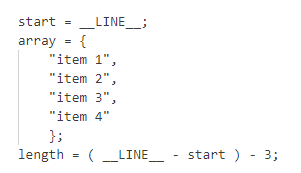Python allows programmers to pass additional arguments to functions via comments. Now armed with this knowledge head out and spread it to all code bases.
Feel free to use the code I wrote in your projects.
Link to the source code: https://github.com/raldone01/python_lessons_py/blob/main/lesson_0_comments.ipynb
Image transcription:
from lib import add
# Go ahead and change the comments.
# See how python uses them as arguments.
result = add() # 1 2
print(result)
result = add() # 3 4
print(result)
result = add() # 3 4 5 20
print(result)
Output:
3
7
32
Why is this a thing
Thanks, I hate it.
bro what we are devolving
I hate this shit being routinely used in PHP. Symfony uses those functional comments for routing, essentially scanning every controller file as text on every visit, to gather the url patterns above functions. Laravel uses Reflection, which is functionally the same thing, to provide arguments to controller functions. Also, kind of related, the project I’m working now has few functions that use backtrace to return different results based on where they are called from. It is indeed very cursed and I’m ripping out any usages of them whenever I see one.
Comment Annotations were a nessecary thing as php did not support a native way to do it. However, since php 8, there is now native attributes.
That is C++ levels of “why the fuck did they add that.”
The best language is complete, succinct, orderly and clear. And never adds a single goddamn thing ever.
This is heresy.
This is an affront to nature. Comments shouldn’t even make it past the scanner.
IMO comments should never ever be parsed under any circumstances but I probably don’t know enough to really speak on this
Can we just clarify that you mean that comments should never be parsed by the language engine. There are valid annotation systems, but the goal is alway to ensure that one passable can never impact the other.
Imagine if here a comment could create a syntax error! This is even worse for runtime scripting languages like python.
Sure, but let’s just clarify that this is someone going out of their way to create this problem, using Python’s ability to read it’s own code.
Basically, you can load any text file, including a source code file, and do whatever you want with it.
So, a function can be written that finds out whatever’s calling it, reads that file, parses the comments, and uses them as values. This can also be done with introspection, using the same mechanism that displays tracebacks.
No, your intuition is correct, this is extremely cursed.
This isn’t standard python.
libis not in the standard library. Python also doesn’t have any special variables where it stores comments, other than__doc__which stores a docstring. If I had to guess,addis reading the file/REPL via__file__.Is __doc__ storing a comment or just a text string?
It’s a string, although sometimes Python conflates the two. The recommended way to make a multi-line comment is to just make a multi-line string and just don’t use it.
Seen in a code review (paraphrased):

“Why does this break when you add comments in the middle?”
Why would python even expose the current line number? What’s it useful for?
On a serious note:
This feature is actually very useful. Libraries can use it create neat error messages. It is also needed when logging information to a file.
You should however never ever parse the source code and react to it differently.
You underestimate the power of us, print debuggers.
Why wouldn’t it? Lots of languages do. In C++ you have
__LINE__.Because it doesn’t seem like a useful feature. The only occasion I imagine this could be helpful is with logging to the console to track when the function breaks, but even then - still trivial to replace.
Comments should be removed before shipping.
Python is an interpreted language but for a compiled language absolutely (and obviously).
I guess there could be just a script before deployment.
Well now that causes breakage two dependencies down the line. Good luck with that. 😅
The
addfunction in the example above probably traverses the call stack to see what line of the script is currently being executed by the interpreter, then reads in that line in the original script, parses the comment, and subs in the values in the function call.This functionality exists so when you get a traceback you can see what line of code triggered it in the error message
One case where I find it useful, tho it operates in a more limited way, is code in block blocks within code comments in Rust, which are also printed out in the generated documentation. They essentially get ran as part of your unit tests. This is great for making sure that, eg, your examples left in code comments actually work, especially if they’re written in a way that functions like a unit test.
+1 to that!
Ignoring lint issues comes to mind as an at least somewhat reasonable use case.
Some languages use the comments to generate documentation. Something like
// function to add two numbers func Add(num1 int, num2 int)
It’s quite useful to parse comments and generate documentation from them, either as plain old hypertext or in your editor with LSP.
That sounds fine if you have something reading the file independently. But the actual executable code should not be able to access its own comments.
capability is fine. Conflation is stupid. You can also use code to erase itself, but thinking that’s a good idea is generally wrong. But to remove that, you also remove the general ability to erase files.
Comments aren’t normally accessible unless you (independently) open and read the source code file as you would with any arbitrary file.
we need a programming horror community for stuff like this
I assume the people freaking out about how dumb python is didn’t bother to read the code and have never coded in python in their life, because the behavior here is totally reasonable. Python doesn’t parse comments normally, which is what you’d expect, but if you tell it to read the raw source code and then parse the raw source code for the comments specifically, of course it does.
You would never, ever accidentally do this.
…you’d also never, ever do it on purpose.
yeah frankly this post is borderline misinformation, they specifically import a library to read comments as arguments, it’s like redefining keywords in C and complaining about C being dumb
I’m going to say it just is misinformation, if that’s what “lib” is here.
Yeah. ‘lib’ isn’t a standard Python library, it’s the name of the abomination that this person created. Since python has quite a bit of useful introspection, they can do something like:
- get the stack
- find the exact call to
abomination.add() - reparse the text of that line, turn the text of the comment into actual numbers, and add them
Now, I don’t know if python keeps the comments around, so it may involve getting the filename and line number, reading the file, and manually extracting the comment text from that line.
It’s not even actually called lib. The line just straight up isn’t in the image “transcribed”, and it’s
from arglib import comment_argumentsin the original code.Yeah, I gave this one a downvote.
They chose violence.
I fucking hate this, thanks OP
How do I delete this part of the python documentation?
That’s disgusting
checks the community to make sure I’m in programmer humor
Yeah that checks out
You know that this is acutally working right??? 😊
Yup, just one of those posts that could of course work in either












